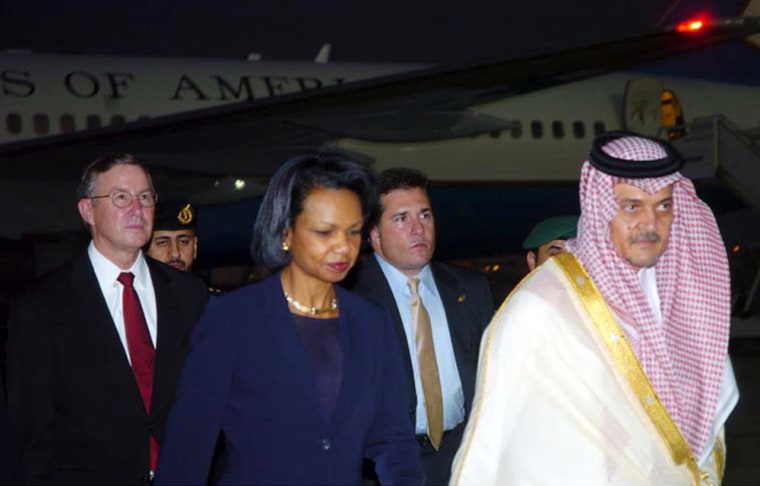Secretary of State Condoleezza Rice appealed Tuesday for an end to fighting among Palestinian factions and said she is looking for ways to strengthen President Mahmoud Abbas in his standoff with Hamas radicals who control part of the Palestinian government.
“Innocent Palestinians are caught in the crossfire and we call on all parties to stop,” Rice said of the worst Palestinian violence since March. “The Palestinians deserve calm.”
New gunbattles erupted Monday night between Fatah gunmen and Hamas militiamen in the southern Gaza town of Rafah, killing two people and wounding 14 a day after a deadly explosion of internal violence paralyzed the Gaza Strip.
Rice spoke during a news conference with her Saudi counterpart as she began a Mideast tour intended to shore up Abbas, as well as the secular Arab governments in Lebanon and Iraq.
Focus on Iran nuke crisis
The Iranian nuclear crisis is also part of Rice’s agenda this week, as an unofficial deadline passes for Iran to heed a United Nations demand to at least temporarily stop its enrichment of uranium. The enriched uranium can be used either to build nuclear weapons, as the United States claims Iran seeks to do, or to fuel nuclear energy reactors, as the Iranians say they intend.
Rice said she hopes Iran may still accept terms of an international bargain that would provide economic incentives in return for a rollback of the nuclear enrichment program, but she said there is nothing to suggest that Iran intends to stop enrichment.
Rice may meet with other world powers late this week to consider the next step, which the United States hopes will be a quick move toward United Nations sanctions unless Iran changes course.
In the face of continued Iranian defiance, “the only choice for the international community is to live up to the terms” of the U.N. resolution this summer that gave Iran a choice between cooperation and consequences.
“And that is to bring sanctions,” she said.
On the nine-month political impasse in the Palestinian territories, Rice said Hamas has been unable to govern effectively and that Palestinians must find a way for their government to meet challenges outlined by world powers.
Hamas trounced Abbas’ secular political movement in January elections but has been unable to govern effectively because of the power split with Abbas and a cutoff of Western and most other international aid after the Hamas victory. The United States and Israel consider Hamas a terror group and refuse to deal with it unless it renounces violence, recognizes Israel and agrees to abide by agreements the struck by the previous Palestinian leadership.
Rice would not comment on whether the Hamas government is close to collapse or to capitulation, but the Bush administration and Israel are increasingly convinced Hamas eventually will crumble, and look to Abbas to capitalize.
'Core problem'
Saudi Foreign Minister Saud al-Faisal said the Saudi government has continued to support the Palestinian Authority, but does not take sides between Hamas and Abbas’ Fatah Party.
He pressed the Saudi view that the Mideast’s many conflicts trace to the conflict between Israel and the Palestinians. He likened that conflict to a disease that weakens the body and makes it more susceptible to other ailments. “We think it is a core problem that, if settled, would have an effect on all the other core problems,” Saud said.
After her meeting with Saud, Rice headed for Egypt where she was meeting later Tuesday with eight Arab allies in Cairo in hopes of reviving the moribund Arab-Israeli peace process and making headway on other regional issues.
During that session, the ministers of the six-nation Gulf Cooperation Council and Egypt and Jordan are expected to coordinate efforts to buttress Abbas’ stature and stem Iran’s growing influence.
Losing patience with Hamas
The trip comes as Arab countries have in recent weeks halted dealings with Hamas. They want it to join a unity government that supports a 2002 Arab League plan that would offer peace to Israel in exchange for land and they’ve even started funneling aid through Abbas, Arab diplomats say.
Egypt, a longtime mediator among Palestinian factions and between Israel and the Palestinians, appears to be losing its patience with Hamas.
Last week, Egypt’s powerful chief of intelligence Omar Suleiman demanded of Hamas the immediate release of Israeli Cpl. Gilad Shalit. Militants close to Hamas captured the soldier in June, triggering Israeli military retaliation. Suleiman has been working for months on a prisoner swap deal.
Abbas was elected separately and retains his position, but the stalemate has hamstrung him as well.
During a visit by Abbas to Jordan on Monday, Jordan’s prime minister urged the world to financially support the Palestinian Authority so it can pay the salaries of government employees. Paying the salaries, now in arrears for six months or more, would probably be the single most important feather in Abbas’ cap at home.
